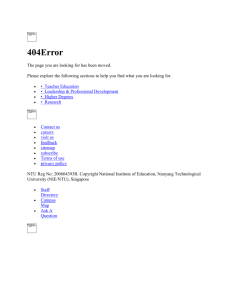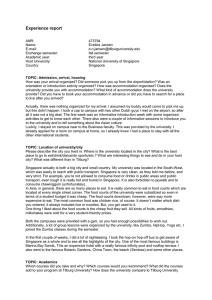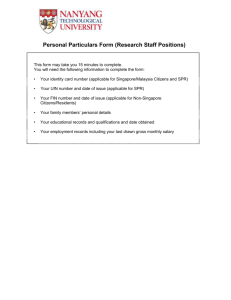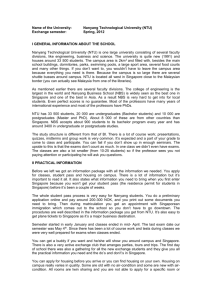E-mail: Study Program: Exchange semester:
advertisement
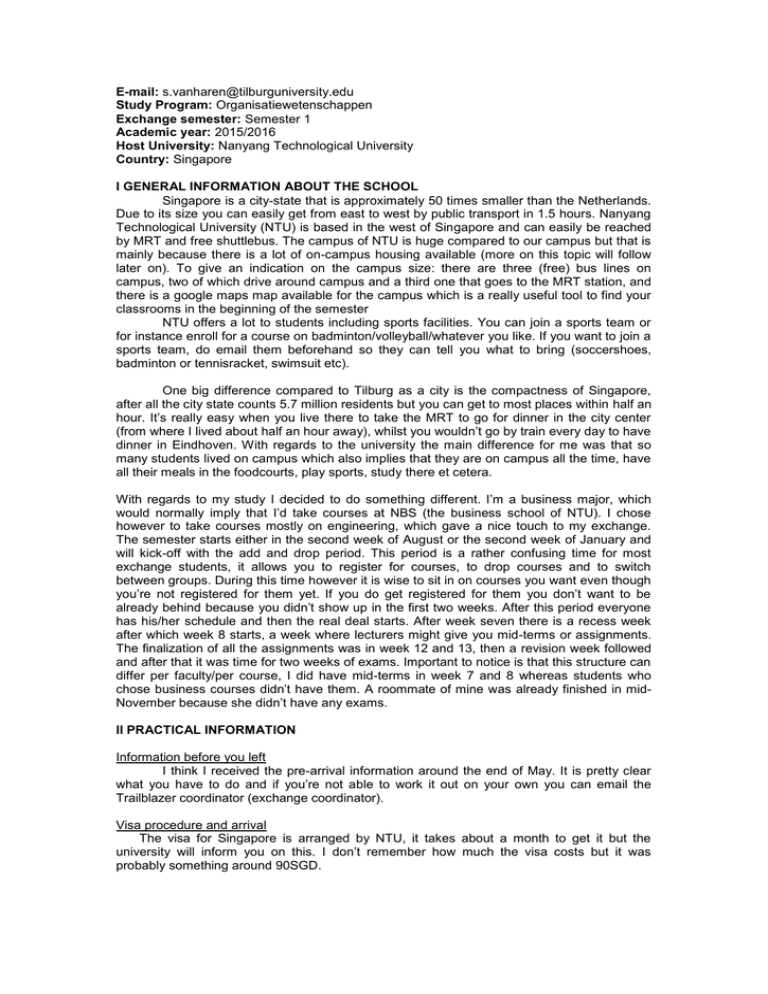
E-mail: s.vanharen@tilburguniversity.edu Study Program: Organisatiewetenschappen Exchange semester: Semester 1 Academic year: 2015/2016 Host University: Nanyang Technological University Country: Singapore I GENERAL INFORMATION ABOUT THE SCHOOL Singapore is a city-state that is approximately 50 times smaller than the Netherlands. Due to its size you can easily get from east to west by public transport in 1.5 hours. Nanyang Technological University (NTU) is based in the west of Singapore and can easily be reached by MRT and free shuttlebus. The campus of NTU is huge compared to our campus but that is mainly because there is a lot of on-campus housing available (more on this topic will follow later on). To give an indication on the campus size: there are three (free) bus lines on campus, two of which drive around campus and a third one that goes to the MRT station, and there is a google maps map available for the campus which is a really useful tool to find your classrooms in the beginning of the semester NTU offers a lot to students including sports facilities. You can join a sports team or for instance enroll for a course on badminton/volleyball/whatever you like. If you want to join a sports team, do email them beforehand so they can tell you what to bring (soccershoes, badminton or tennisracket, swimsuit etc). One big difference compared to Tilburg as a city is the compactness of Singapore, after all the city state counts 5.7 million residents but you can get to most places within half an hour. It’s really easy when you live there to take the MRT to go for dinner in the city center (from where I lived about half an hour away), whilst you wouldn’t go by train every day to have dinner in Eindhoven. With regards to the university the main difference for me was that so many students lived on campus which also implies that they are on campus all the time, have all their meals in the foodcourts, play sports, study there et cetera. With regards to my study I decided to do something different. I’m a business major, which would normally imply that I’d take courses at NBS (the business school of NTU). I chose however to take courses mostly on engineering, which gave a nice touch to my exchange. The semester starts either in the second week of August or the second week of January and will kick-off with the add and drop period. This period is a rather confusing time for most exchange students, it allows you to register for courses, to drop courses and to switch between groups. During this time however it is wise to sit in on courses you want even though you’re not registered for them yet. If you do get registered for them you don’t want to be already behind because you didn’t show up in the first two weeks. After this period everyone has his/her schedule and then the real deal starts. After week seven there is a recess week after which week 8 starts, a week where lecturers might give you mid-terms or assignments. The finalization of all the assignments was in week 12 and 13, then a revision week followed and after that it was time for two weeks of exams. Important to notice is that this structure can differ per faculty/per course, I did have mid-terms in week 7 and 8 whereas students who chose business courses didn’t have them. A roommate of mine was already finished in midNovember because she didn’t have any exams. II PRACTICAL INFORMATION Information before you left I think I received the pre-arrival information around the end of May. It is pretty clear what you have to do and if you’re not able to work it out on your own you can email the Trailblazer coordinator (exchange coordinator). Visa procedure and arrival The visa for Singapore is arranged by NTU, it takes about a month to get it but the university will inform you on this. I don’t remember how much the visa costs but it was probably something around 90SGD. I arrived in Singapore together with my roommate (who happens to be from Tilburg as well) and we had to find out ourselves how to get to our apartment. It wasn’t arranged by the university, but maybe it is when you stay on campus. Orientation/Introduction activities There was an orientation day/three hour lecture on how to use blackboard, the add/drop period, healthcare et cetera. It was really informative and at one point somewhat surprising, but you’ll find that out yourself. After the information session you could eat something and buy tickets for the NTU fest, but besides students who were helping out there, we didn’t see any locals at that point. Housing Less than 50% of the exchange students was allocated for on-campus housing, I wasn’t one of them so I had to search for accommodation myself. Originally I booked a hostel for the first few nights in Singapore so I could go house-hunting from there. However in the week before I left for Singapore I got in touch with an agent who set me up with an apartment. Living Costs I got money from my dad, I have a student loan and I received some money from the government for my public transport card. The living expenses all together were probably around the same as in Tilburg. The housing costs were higher, alcohol was more expensive and clubbing as well, for food however you pay way less than you would in Holland. Same goes for public transport, it’s not for free but you pay around 1,40 euro for half an hour with the public transport. Most of my money was reserved for housing and for saving up for travelling. I would suggest to spend money on housing, it is expensive or at least more than what we are used to in Tilburg, but it is worth it to stay on a private park compared to public housing. Monthly budget Housing 575SGD Food 150 SGD Transport 50 SGD Books 30 SGD Miscellaneous 40 SGD Social Activities Since I didn’t stay on campus, I wasn’t really involved in activities organized for exchange students by the university. I did have contact with locals however, most of them I met through courses that we took together. The easiest way to meet other exchange students was to go to the One Big Family parties. A former exchange student organized deals with clubs and set up dates and times to meet each other. You are free in going there of course, but especially in the beginning of your exchange it is a really easy and convenient way to meet other people. During my time in Singapore I went to several countries. During the recess week we went to Indonesia (Bali and Lombok), I’ve been on a weekend trip to Tioman (Malesia) and I’ve been on a long weekend trip to my family in Qatar. After the exams I went to Vietnam for a month. Culture and Language Luckily enough I didn’t really experience a culture shock in Singapore which doesn’t really surprise me, after all it is a really developed country. The cultures are quite different though, but the cultures between the residents of Singapore are also really different. Even though you have a different culture than the most Singaporeans, you don’t really notice it, especially when it comes to the younger generation. Maybe the most clear example about a culture difference is with regards to school. Every local studies so hard, or at least seems to study really hard, and they don’t take any time off. The word relaxation doesn’t really seem to be in their vocabulary. Before I went to Singapore I didn’t take any language courses, I did take the test that is mandatory if you want to go on exchange. My English was sufficient enough so I didn’t need to take any other classes to improve it. In Singapore most people also speak English, even though it is a weird form of English which is called Singlish. You do get used to their way of speaking after a while, but don’t be surprised if it is hard to understand at first. Personal Development The main thing I have learned from this exchange is the different ways of communicating with people from other cultures. Group work at NTU was way different from group work at our university, writing a report was a whole new experience and getting things done in an efficient way was most of the times a bit hard. For my future career the exchange might be a nice addition, but I’m not sure whether it is a big plus. The whole exchange, or at least the study was for me one big learning experience, mainly since I chose to study engineering courses. If I could go back I might want to change that, it did keep me busy while others were out having fun, but I also need these courses in order to get admitted to a certain master and since I passed them all I wouldn’t change it for the world! III ACADEMIC INFORMATION Courses All my courses were offered in English. As I mentioned above I mainly took engineering courses which are: Environmental Issues in a Changing World, Chemical Thermodynamics and Essential Mathematics. Besides these three courses I also took Strategic Management. The latter course was a nice addition to my bachelor, the former courses were suggested by the coordinator of the master I want to do. I can’t really compare the level of the courses with the courses offered in Tilburg, simply because I never took engineering courses before. The teaching for mathematics and thermodynamics was more practical in the sense that you needed to make calculations afterwards, the other lectures were more theoretical. All of the exams were written exams. Other Every student can go to the library and access the computers with his/her matriculation number and password. It almost works the same as in Tilburg and they also have the eduroam network for the wifi! Description of Courses Course AB3601 CH3103 EN2001 MH2813 Name Strategic Management Chemical Thermodynamics Environmental Issues Essential Mathematics BA/MA BA Prerequisites None Exam Written ECTS 7.5 BA CH1011/CH2011 Written 5.5 Comments 2x small assignment, 1x big assignment Mid-term BA None Written 5.5 Mid-term, assignment BA None Written 5.5 Mid-terms Tips for the future students: I would definitely recommend an exchange! If I could go myself another time I would do it. Don’t prepare to much before going on exchange, it is a hectic ride and sitting back and relaxing is all part of it. It will always turn out different if you plan everything ahead, no need just enjoy! One tip that might be an important one for everyone, if you are allergic to whatever that people put it in food (I am allergic to nuts and peanuts for instance), make sure you have a note also in Mandarin which says that you are allergic. Not everyone is a sufficient enough speaker in English and having a note in Mandarin will increase the chance on getting food without whatever you are allergic for.
